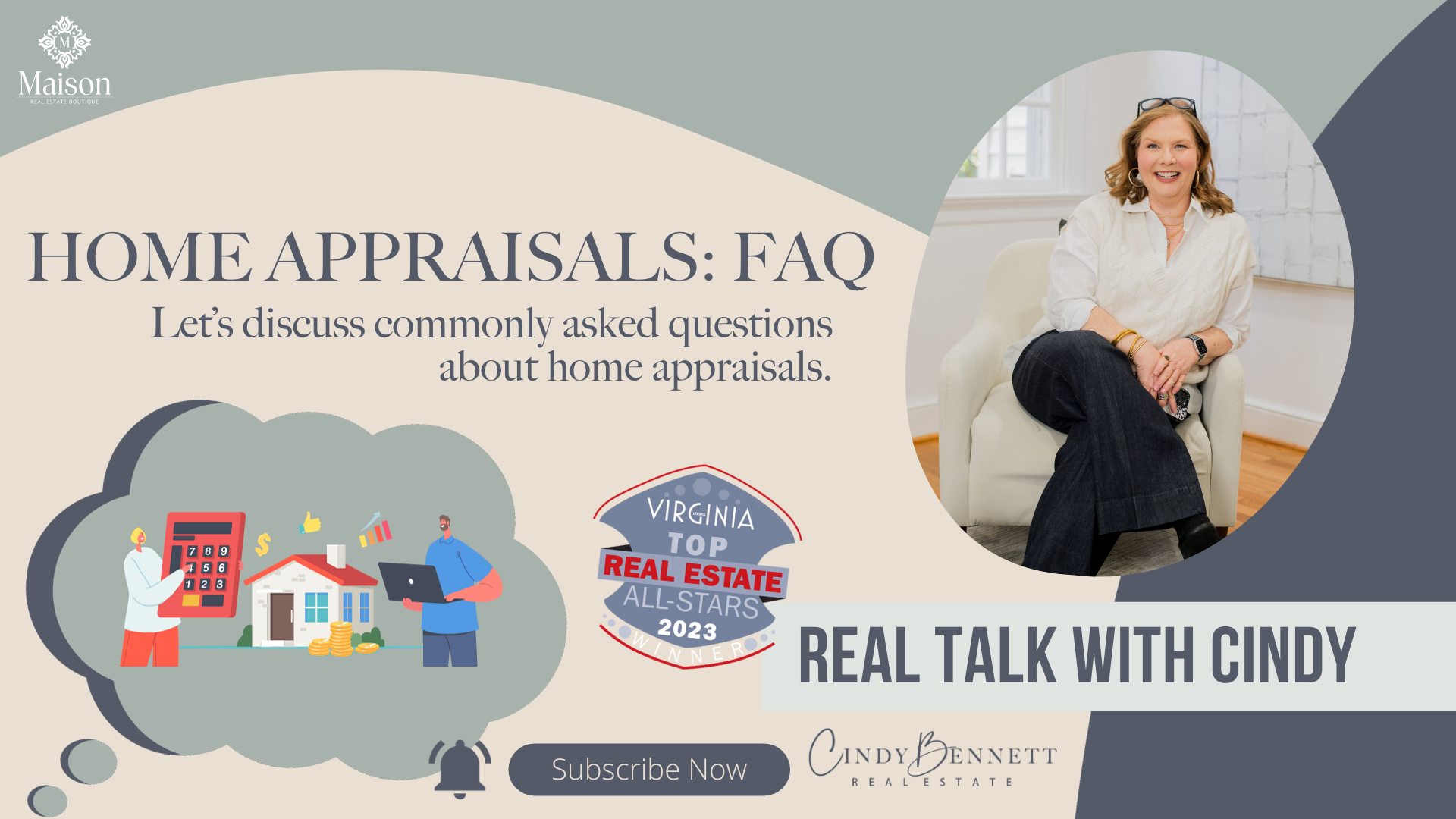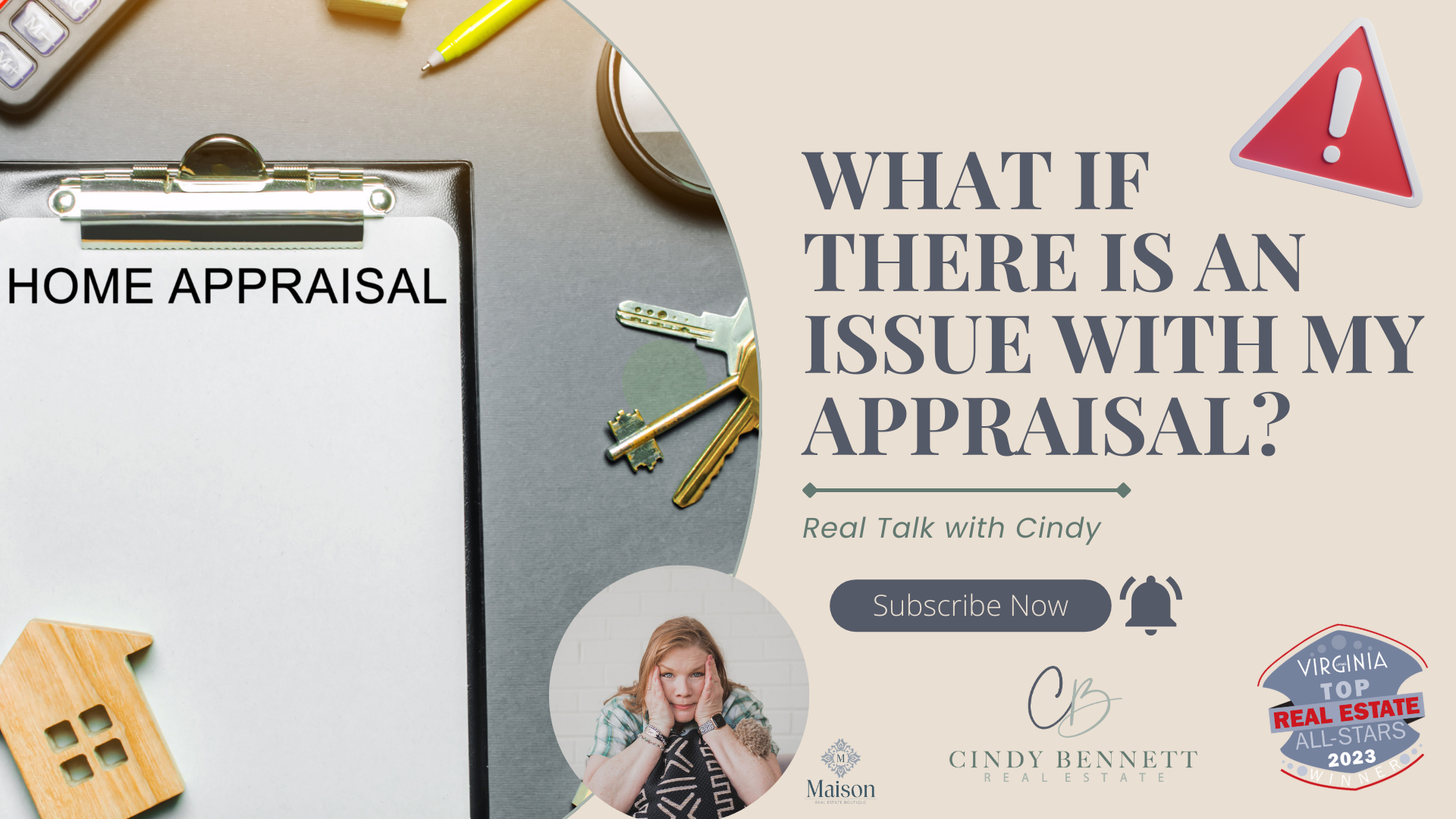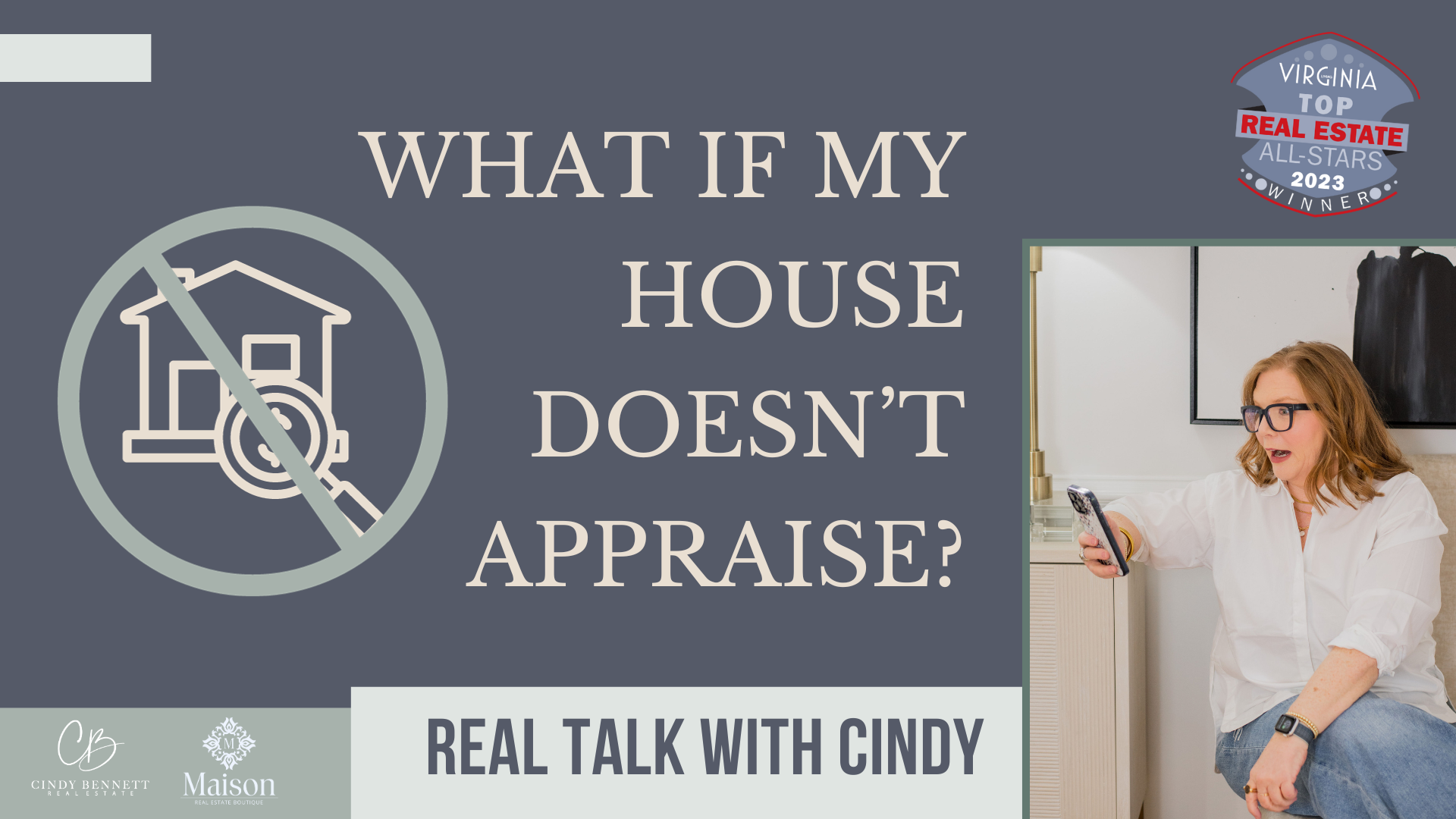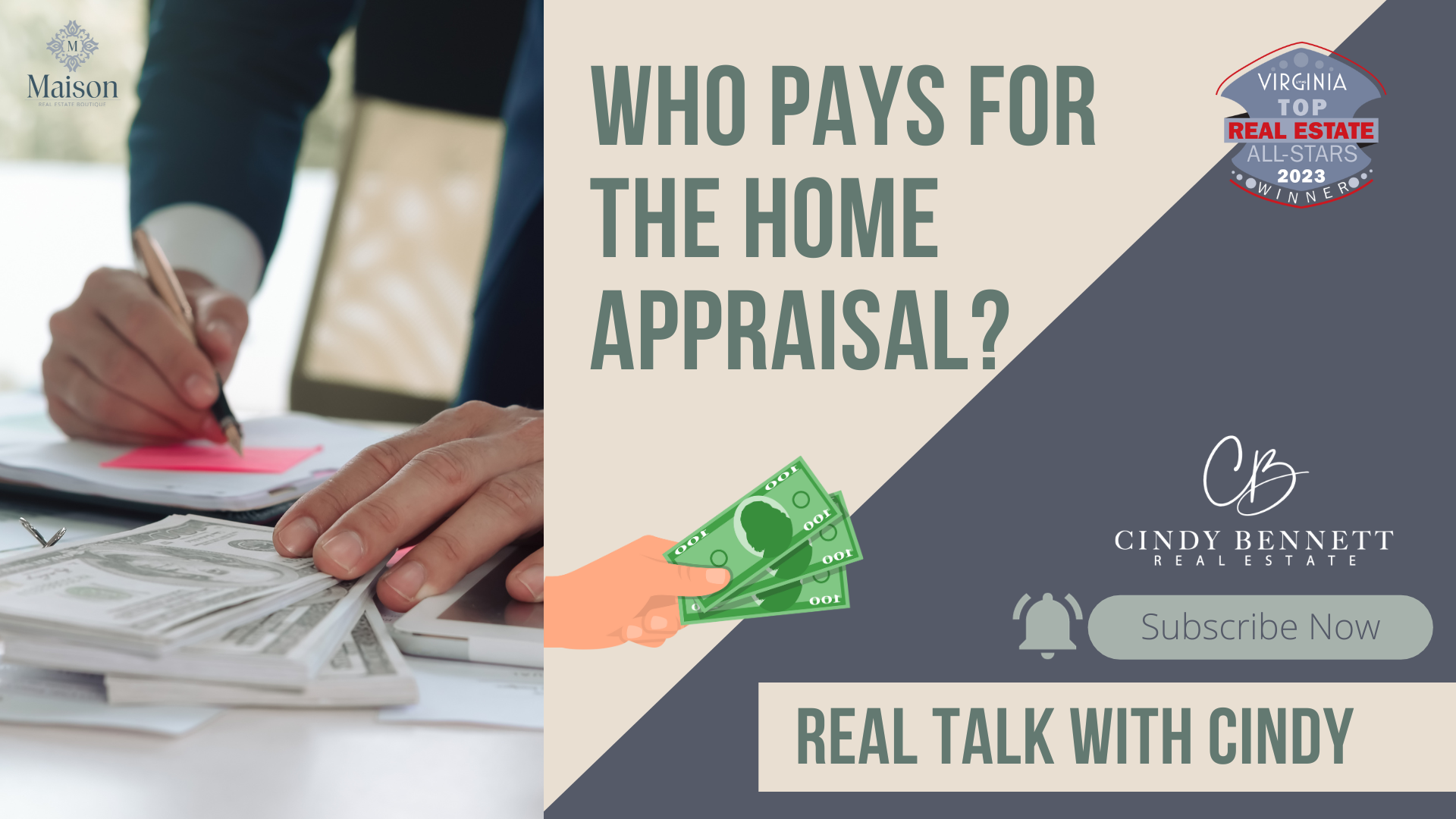real estate appraisal
Keep on top with latest and exclusive updates from our blog on the Los Angeles real estate world. Cindy Bennett Real Estate posts about tips and trends for buyers, sellers, and investors every week. Whether it be about staging your property or a snapshot of the market, this is your one stop shop.

So if you've followed along thus far with all of my videos about appraisals and how they might impact your transaction, thank you. This is the sort of wrap-up. I'm going to talk about a couple of frequently asked questions, commonly asked questions, and maybe a few interesting experiences that have happened with appraisals, that I don't know, kind of throw a curveball, or give you a little bit more food for thought. So one of the commonly asked questions is, if I'm selling my home, and the house contracted for $450k, the appraisal came in at $425k, does that mean I'm losing $25,000? Well, remember, you never had the $450k. So that's sometimes the data just is what the data is and unfortunately, or fortunately, the appraisers don't really consider the the vibes of the house, the vibes of the deal. So just because you are the purchaser and loved the house enough to be willing to pay $450k, if they don't love the house enough to be willing to pay $450k, and they also have a suitcase full of cash to match their vibes, it doesn't really matter, because most people who are getting a loan are going to have an appraisal, and that appraisal is going to be sort of the buck stops here of the value of the house. So yeah, you didn't get what you wanted to get maybe, or you didn't get what you were thinking you were gonna get. But odds are, you're not going to have a drastic difference in another set of data or another appraiser coming with another buyer, perhaps, if that buyer too does not have a suitcase full of cash to bridge the difference between $425k and $450k. Does that make sense? So let's look at the flip side of the same coin and let's say I'm the seller, and I have my house contracted with a buyer for $450,000, we get the appraisal back. And lo and behold, it came in at $475k. Am I clicking up my heels and saying, oh my gosh, I just made an extra $25,000? Not so fast. So this is great for the buyer. In most cases, the buyer does then have a little instant extra equity beyond what they had thought, but at the end of the day, know that price only shifts downward. Should the appraisal come in low, it never goes up. So while it might be a little frustrating, and you might feel like you lost money or left money on the table, remember, you didn't have that money to begin with. This is just kind of a numbers accounting situation and in many cases, you're not even going to see the appraisal. So don't get real tied up in what the lender or the appraiser determines what the value of your house is. If it goes beyond the sales price that you've agreed upon, just remember that you agreed upon that sales price and unless you have other people who were willing to pay more for your house, this is what you agreed to and this is what the open market was willing to value your house at. Thanks for following along if you have any other questions about appraisals or how they can affect your transaction, whether you're buying or selling, drop in the comments or reach out to me and I'd love to help you get your questions answered so you're more well informed when you're ready to buy or sell your home.
Read more
Okay, so let's say you got a contract for $450,000, but the appraisal came in at $425,000. Maybe you don't have $25,000 extra to throw at it. If you're the buyer, you're trying to get creative and think of other solutions. Maybe you go back to the seller and you say, hey, you know, well, we're able to do $435,000, but that's all we can do. We'll put $10,000 extra towards it, but that's all we can do. That's all we're able to do, willing to do, whatever. Maybe the seller comes back and says, yes, that works. Maybe you split the difference. Again, in real estate, as long as everybody agrees almost anything, as long as it's legal, is on the table. Everybody just has to agree and it all has to be in writing. Follow along for more appraisal tips, tricks, understandings, commonly asked questions, and situations that might arise whether you're on the buying end or the selling end.
Read more
So what do you do if there is an issue with the appraisal? Let's give an example. You purchase a house for $450,000 and the appraisal comes back and it's $425k. Now, what do you do? Well, in our contract, and again, this is the Central Virginia contract. So I'm in the Richmond area, surrounding counties, we have our own particular contract, the contract where you are may be different. In our contract, it states that within five days of receiving that appraisal, the purchaser has the right to request in writing, whatever sort of resolution they would like from the seller and that can be a number of different things. First off, they can request that the price be reduced. So if the house is $450,000, that's what the contract price is, the appraisal comes in for $425k. Maybe you're the purchaser and you don't have an extra $25,000. You may have to go to the seller in writing and say, 'Can you please reduce the price to $425k'. Now they can say yes, or they can say no, or they can present a different option. But if you cannot come to a resolution, then all parties can walk away. No harm, no foul. Another resolution might be that, say you were in a competitive situation when you wrote the offer and you wrote the offer for $450k. There were a number of other offers, you do have the cash to back it up, and you say, oh rats the home appraisal came in at $425k, but we really want the house. We feel like it's worth $450k. It's worth 450 to us and we're willing to throw an extra $25,000 in there to bridge that gap. Obviously, you need to have 25,000 extra dollars. Or in some cases, you can kind of maneuver your loan a little bit to come up with a little extra cash, but that's between you and your lender. So the buyer can actually pay the cash difference, the lender doesn't care. What the lender cares about is if they're giving you 80% of the value, they're only going to give you 80% of the value that the appraiser says it's worth, period, end of story. They're not going to give you any extra because you really liked the house because it was a competitive situation. They don't care because it's the bottom line number for the lender and that is ultimately who the appraiser works for.
Read more
So maybe you've followed along with my appraisal series, maybe you're in a transaction, maybe you're contemplating what might happen in a transaction and you're thinking, but Cindy, we don't want to put an extra $10,000, $20,000 in a house if it didn't appraise. What do we do now? Well, obviously, nobody wants to feel like they're overpaying and I think overpaying is a real relative term when we are in the market that we've been in for the last few years really. Overpaying really is a nebulous idea. If 10 people want the house and the house was listed at $410k, and it gets bid up to $450k, and there were multiple offers. You competed against nine other people, you got the house at $450k. Good for you. You won. But now the appraisal comes in at $425k and you don't know what to do. You don't have an extra $25,000 to get you there. So there are a few options. And I've talked about some in other videos. But what if you want to dispute the appraisal? What if you feel like hey, this is not right. I feel like this house is really worth $450k and I want to make sure that my deal doesn't fall apart because we love this house. Or maybe you're the seller and you say listen, I had 10 people want to buy my house, and fair and square, we got bid up to $450k. Now some person is coming in and telling me and the buyers that it's only worth $425k. You're really throwing a wrench in my plans. What do you do in those cases? Well, you can dispute an appraisal, but it is a process. Because the lenders really want to make sure that it's an unbiased sort of set of data and an unbiased opinion of value, they're not real keen on the agents, whether listing or buyer's agents, or the buyers and sellers getting real involved in that process and trying to manipulate that data. Because again, unbiased means they're looking at data, and the data is the data. But I have had situations where we were successfully able to dispute the appraisal. It doesn't happen often though. You really have to have, again, data to go back to the appraiser and say, here is a comparable that you did not use. Why didn't you use this comparable? It almost never works, because these people do their job and the appraisal has to be reviewed by someone else in their office as well. It's not a one person saying check, yes, this house has, you know, everything that it takes to be a $450,000 house. It really has to have all of the supporting information and it gets reviewed a number of times before that stamp goes on to say this is complete. So if you do have comparables that show something or when you look at the appraisal, they have missed something that is an integral part of your house, it's got a brand new roof, but they noted that the roof was old because maybe they made a mistake or you know, they're human. So maybe somebody didn't have all their coffee that day and thought the roof looked old. There is a process, through which it's a little different with every lender, you can dispute the appraisal, but just remember that odds are it's not usually going to go in your favor. So you may need to look at some of the other options to work that appraisal out. If you have any questions about the appraisal process or the appraisal dispute process, drop them in the comments or reach out to me. I'd love to help you. Figure out how you might deal with such an occurrence. But if you're currently in a transaction, I'm going to say reach out to your lender, your agent or your attorney and figure out how to best deal with that situation.
Read more
All right, so let's talk about the nuts and bolts when we're talking about appraisals. Who pays for the appraisal anyway? And if I'm selling my home, and somebody's gonna come in and put a value on it, that's different than the value I put on it and my listing agent put on it, who is this person? Who are they working for? And how does this whole thing work? Well, the buyer pays for the appraisal. And yes, if you are the buyer, you are going to have to pay for the appraisal outside of closing. It is kind of sort of rolled into your closing costs, but generally, your closing costs are going to be paid at settlement on the closing day, and the appraisal is going to have to be paid beforehand. Why? Well, because in the instance that the appraisal throws a curveball to the whole situation, and you don't end up closing those appraisers would never get paid, because nobody is going to pay for a sour deal that didn't go through. So your lender is going to require that you pay that appraisal cost up front. And those numbers can vary, but usually between $500 and $1,000, is about where you're going to land in our area. Again, I work in Richmond, Virginia, and all the surrounding counties, you know, in central Virginia, and that's kind of a common cost here. In the event of an appraisal dispute where you or the seller may request a new appraisal or a new appraiser, then that cost can be shared, it can be split, or sometimes the seller might offer to pay. Again, anything like that, as long as it's legal can be worked out as long as everybody agrees on it. Generally speaking, though, the data is what the data is. So you want to look long and hard before you pay for a new appraisal if the data is not going to be any different. First, you're going to try to dispute that original appraisal before you go looking for a new appraisal or a new appraiser. Because, if they're going to pull the same data, then you've just wasted $500 to $1,000. Follow along for more information about appraisers about appraisals, how the whole experience works, and what it can do to affect or impact your transaction whether you're buying or selling.
Read more
So we know what the appraiser does, who they are kind of, but who picks them? And okay, I can't pick them. But who does? And how does that affect me? Well, if you're the purchaser, you really don't have any input on the appraisal process or who gets to do your appraisal or anything like that. Ultimately the appraiser works for the lender. They are making sure that if the lender is going to loan you $400,000, that the property is actually worth $400,000. Now, maybe you're paying $450,000 for the home, but the lender is only going to be loaning you $400,000. The lender needs to make sure that whatever they're giving you is, if it's an 80% loan, if it's a 75% loan, whatever, that they are covered for the amount that they have invested in the property. In other words, the lender usually has a larger financial stake than you do in the property and they want to make sure that should you stop paying and they get stuck with that house, that they can actually sell it for what it's worth, not just what you think it's worth. Follow along for my whole series on appraisals and appraisers, to get a little better feel about what goes on in the appraisal process and why it matters to you whether you're a buyer or a seller.
Read more
I may have mentioned before, back in the olden days before the mortgage crisis of 2007/2008, the appraisers were able to be chosen. So, maybe somebody had a specialty in the city of Richmond and that is the appraiser that everybody would call if they had a property in the city of Richmond, especially if it was a property that I don't know might be a little trickier to appraise, and the lender and or the agents were able to request a particular appraiser. That is no longer the case, because the appraisal companies, the appraisers themselves, work for the lender. The lenders have to have an unbiased opinion of the value. Somebody who is not necessarily chosen, they just get handed the name of that appraiser and when that happens, we do get a more unbiased opinion of value. But sometimes it can create a problem if an appraiser is not totally familiar with the nuances of a particular area or neighborhood. In most cases, it's fine because the data is what the data is right? But trickier appraisals can happen. And there are ways to deal with those too. So, follow along for my whole series on appraisals and get a little bit more information about what can happen, what the pitfalls are, why you want an appraisal or maybe you know that you're going to have an issue and you want to know what might happen and how to deal with those problems.
Read more
If you're thinking of buying or selling a home, one of the things that's going to affect you on either side is the appraisal. So I'm going to do a short chapter, series, number of episodes on appraisals and tackle some of those frequently, commonly asked questions or situations that come up in the appraisal process. First things first, what is an appraisal? An appraisal really is an opinion of value. It is the most objective opinion of value because it is made by an uninterested party, right? It's not what the seller thinks the property is worth. It's not what the buyer thinks the property is worth. Nor is it what the agent thinks the property is worth. It is really an opinion of value by a an educated appraiser who only does appraisals. They are not involved in the transaction and it's based on the comparable sales around the property. So, you cannot use a property that's 50 miles away. You cannot use a property that is unlike the subject property. But it is an opinion of value, so they're not always going to be exactly the same, but they have to use information to back them. If you're curious about how appraisals work, what goes into the appraisal process and how it can affect you. If you're a buyer or seller follow along for the whole series and I'm going to answer all the questions you can think of about appraisals.
Read more


